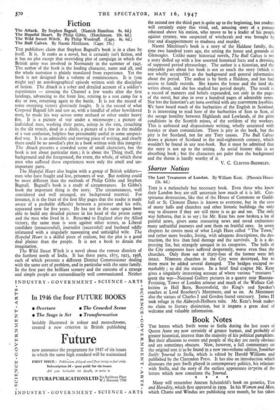Fiction
THE publishers claim that Stephen Bagnall's book is in a class by itself. It is. It ranks as a novel, but it certainly isn't fiction, and it has no plot except that overriding plot of campaign in which the British army was involved in Normandy in the summer of 1945. The author of the book is the leading character, name and all, and the whole narration is plainly translated from experience. Yet the book is not designed like a volume of reminiscences. It. is (you might say) an autobiographical episode written with the discipline of fiction. The Attack is a sober and detailed account of a soldier's experiences — crossing the Channel a few weeks after the first landings, advancing to the front line, retiring to a rest camp for a day or two, returning again to the battle. It is not the record of some sweeping victory gloriously fought. It is the record of what Corporal Bagnall felt and saw as, with a handful of other bewildered men, he made his way across some orchard or other under heavy fire. It is a picture of war under a microscope ; a picture of individual men, washing their pants, asleep in the rain, crouching in the slit trench, dead in a ditch; a picture of a few in the middle of a vast confusion, helpless but presumably useful in some unspeci- fied way. It is an admirable and moving piece of writing, and clearly there could be no novelist's plot in a book written with this integrity. The Attack presents a crowded scene of small characters, but the book is not about particular men ; it is about the Thing itself, the background and the foreground, the event, the whole, of which these men who suffered these experiences were only the small and un- important parts. The Hopeful Heart also begins with a group of British soldiers— men who have fought and lost, prisoners of war. But nothing could be more different than the methods of Philip Gibbs and Stephen Bagnall. Bagnall's book is a study of circumstances. In Gibbs's book the important thing is the story. The circumstances, well considered and well arranged, are background material. For instance, it is the fruit of. the first fifty pages that the reader is made aware of a probable difficulty between a prisoner and his wife, separated now for five years. He has not in the same space been able to build any detailed picture in his head of the prison camp and the men who lived in it. Returned to England after the Allied victory, the same man is seen against other scenes, as Liberal candidate (unsuccessful), journalist (successful) and husband oddly infatuated with a singularly nauseating and unfaithful wife. The Hopeful Heart is a skilful piece of realism, but the plot is a good deal plainer than the people. It is not a book to detain the imagination. The Wild Sweet Witch is a novel about the remote districts of the furthest north of India. It has three parts, 1875, 1923, 1938, each of which presents a different District Commissioner dealing with the same sort of problem, and in particular with the same family. In the first -part the brilliant scenery and the customs of a strange and simple people are extraordinarily well communicated. Neither the second nor the third part is quite up to the beginning, but readers will certainly enjoy this vivid, sad, amusing story of a peasant educated above his station, who strove to be a leader of his people against tyranny, was suspected of witchcraft and was brought by fear and disappointment to madness and murder. Naomi Mitchison's book is a story of the Haldane family, the time two hundred years ago, the setting the house and grounds of Gleneagles. Unlike many historical novels, The Bull Calves is not a story dolled up with a few assorted historical facts and a dressing of supposed period phraseology. The author is a historian, and the enjoyable part about her book is -not so much the story (which is not wholly acceptable) as the background and general information about the period. The author is by birth a Haldane, and has had access to family records. She knows the house and the land she writes about, and she has studied her period deeply. The result is a record of manners and beliefs expounded, not only in the pages of the novel, but also in over a hundred pages of admirable notes. Nor has the historian's art been overlaid with any convenient loyalties. We have heard much of the barbarities of the English in Scotland. It is interesting to read here of the barbarities of Scot to Scot, of the savage hostility between Highlands and Lowlands, of the grim conditions in the Scottish mines, of the serfdom of the workers. This is unbiased and dispassionate writing, wholly untainted with heroics or sham romanticism. There is pity in the book, but the pity is for Scotland, not for any Tory causes. The Bull Calves draws a picture of Scotland in the mid-eighteenth century, which wouldn't be found in any text-book. But it must be admitted that the story is not up to the setting. As social history this is an absorbing book ; but the characters are paler than the background and the theme is hardly worthy of it.
V. C. CLINTON-BADDELEY.


































 Previous page
Previous page